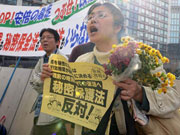Xu Yidong, 28, has been learning to make Jinghu, a Chinese bowed string instrument used in Peking opera, from his grandfather, a master Jinghu artisan, for more than nine years. Very few people are willing to learn to make Jinghu which requires peace of one’s mind as well as manual dexterity. Xu Yidong admits that making Jinghu is boring because the production process is the sophisticated and complex; it is also very time consuming. However, he is willing to carry on the traditional craft of Jiinghu.
Like most of its relatives, Jinghu has two strings that are customarily tuned to the interval of a 5th which the hair of the non-detachable bow passes in between. Jinghu is the smallest and highest pitched instrument in the huqin family.
The strings were formerly made of silk, but in modern times are increasingly made of steel or nylon. Unlike other huqin instruments (erhu, gaohu, zhonghu, etc.), it is made of bamboo. Its cylindrical soundbox is covered with snakeskin on the front (playing) end, which forms a taut drum on which the bridge rests, sandwiched between the drum and the strings, which are connected to a peg at the bottom of the soundbox.
In Peking opera, Jinghu often doubles the singer's voice. Jinghu performers in Peking opera rarely shift into higher positions, instead they choose to compress the melody into a single octave.
 |

 Record of Chinese expressions in 2013
Record of Chinese expressions in 2013 Chinese naval escort fleet conducts replenishment in Indian Ocean
Chinese naval escort fleet conducts replenishment in Indian Ocean Weekly Sports Photos
Weekly Sports Photos 17th joint patrol of Mekong River to start
17th joint patrol of Mekong River to start Spring City Kunming witnesses snowfall
Spring City Kunming witnesses snowfall China's moon rover, lander photograph each other
China's moon rover, lander photograph each other Beijing tenants
Beijing tenants  China's aircraft carrier carrys out 1st docking manoeuver in Sanya
China's aircraft carrier carrys out 1st docking manoeuver in Sanya Japanese stage protest against secrecy bill
Japanese stage protest against secrecy bill Office ladies receive ‘devil’ training in mud
Office ladies receive ‘devil’ training in mud  Heavy cargo flights taking off
Heavy cargo flights taking off
Day|Week|Month